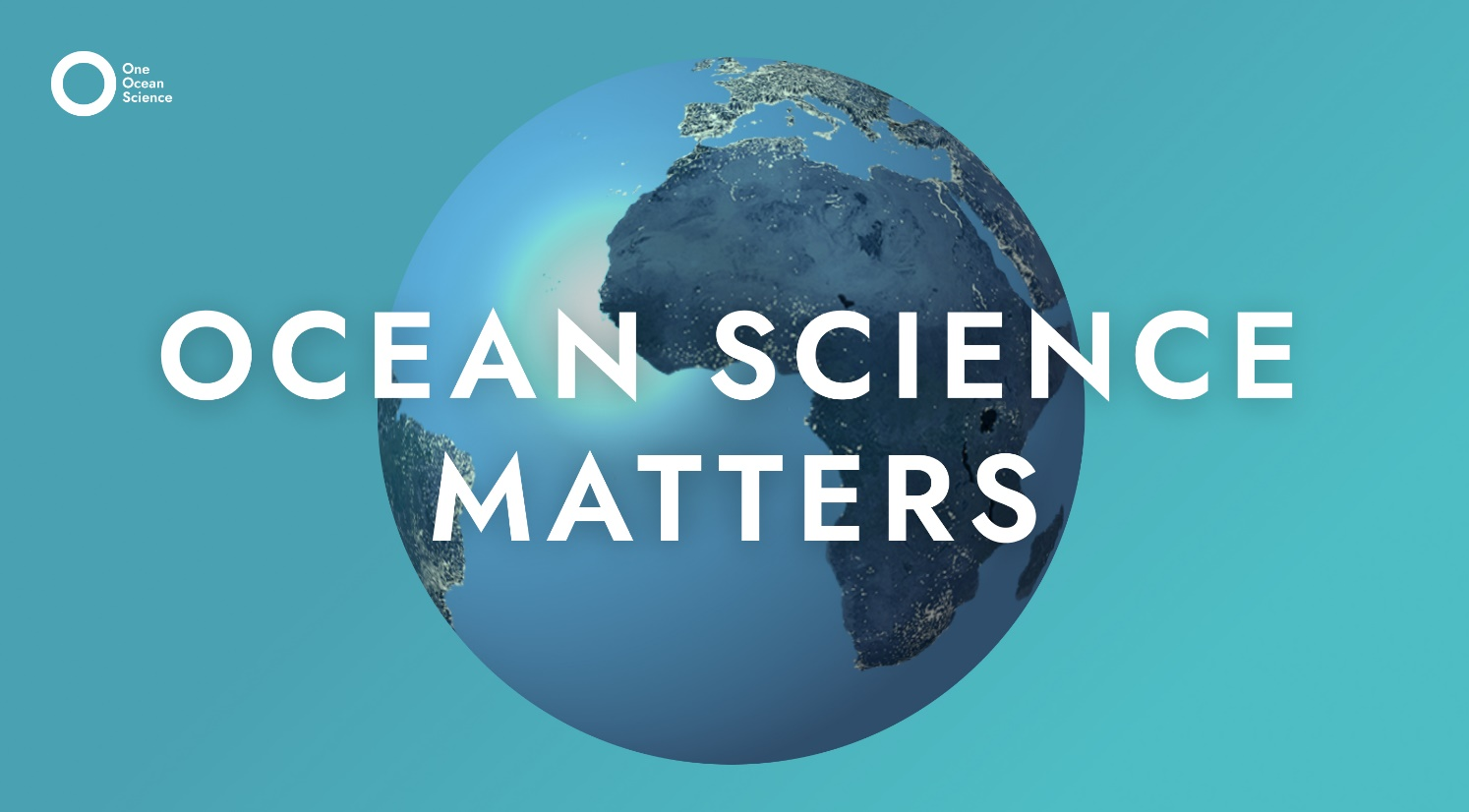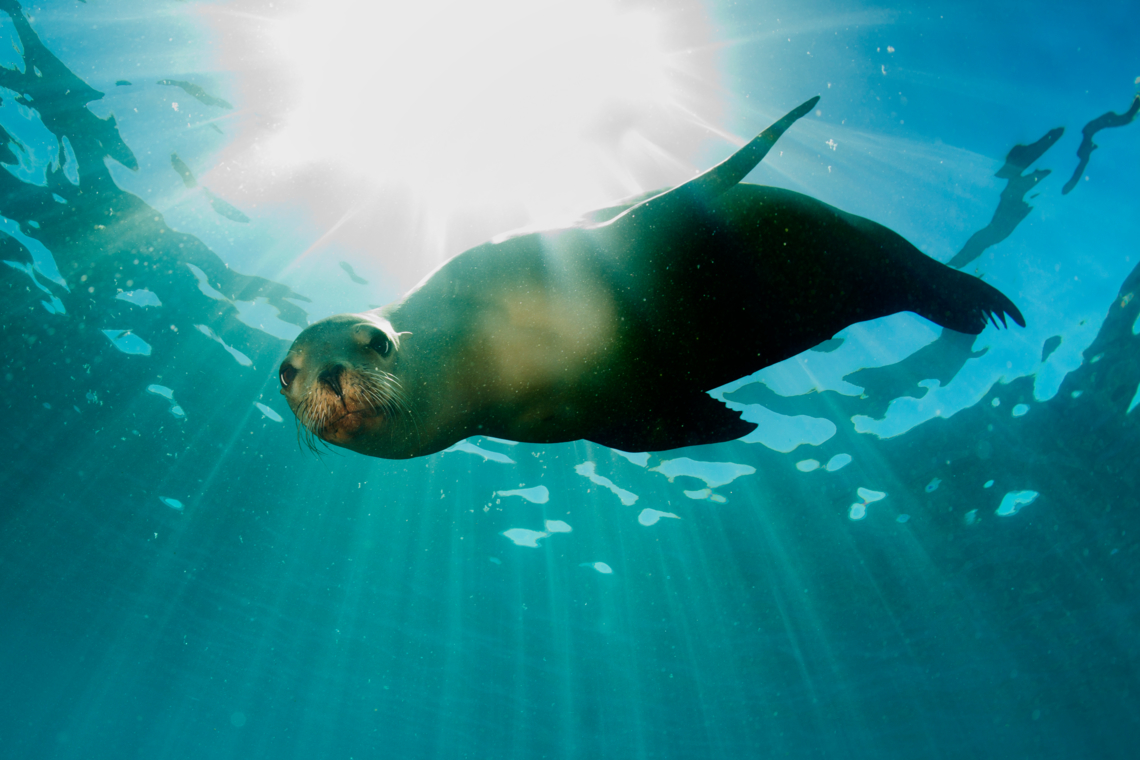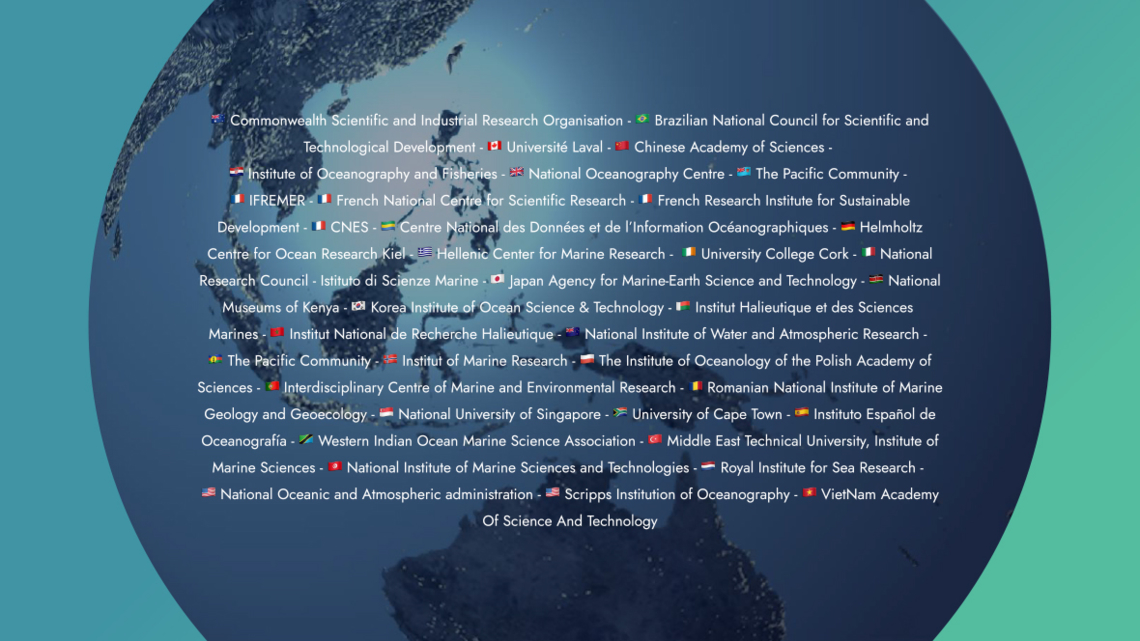(This article is reproduced from the Ifremer website. Link: https://wwz.ifremer.fr/en/Latest-news/Ocean-sciences-are-essential-in-the-fight-against-climate-change)
Full steam ahead toward the 26th UN Climate Change Conference of the Parties (COP26)!

On October 25, Ifremer, the CNRS and the IRD, with support from the Ocean & Climate Platform and ESA astronaut Thomas Pesquet, are launching a digital world tour of ocean and climate sciences, christened OneOceanScience. Scientists from the entire world are participating. Together, they will explain why ocean sciences are essential for better understanding and protecting the ocean. "Why ocean science matters?" They're sounding the alarm: the ocean's well-being affects all of us and it should be a central part of the climate negotiations.
Sharing oceanography stories and triumphs from around the world
Brought together by OneOceanScience, 37 scientists from 33 countries will speak up through a series of short videos on the immersive platform oneoceanscience.com. They'll talk about why ocean science is essential. ("Why ocean science matters?") They'll explain how the ocean and climate are linked and what solutions they're working on to preserve ocean ecosystems and society in the face of climate change.
In a video recorded at the International Space Station, ESA astronaut Thomas Pesquet will share his vision of the ocean and lend support to scientists.
Thanks to support from the Ocean & Climate Platform, the OneOceanScience campaign will also be present at COP26 in Glasgow to represent ocean sciences ahead of the international negotiations.
Ocean and climate are intimately interconnected
Recognition of the ocean's true value is well overdue. As it covers more than 70% of our planet, it connects us, feeds us, gives us energy, heals us, and inspires our dreams.
"The ocean is our planet's thermostat. It has already absorbed 30% of the CO2 that humans have emitted since the beginning of the Industrial Age and it continues to store enormous quantities of heat, which softens the effects of climate change. Today, the number-one issue is learning how the ocean works so we know how long it will protect us. This is the goal we work toward every day," says Virginie Thierry, an oceanographer at Ifremer who tracks climate change into the ocean's depths with autonomous Argo floats.
"The ocean is home to incredible marine biodiversity. We have already identified thousands of marine species, although given the expanse of the ocean, certain estimates indicate that we are familiar with only 10% of its biodiversity. From dark oceanic trenches to the clear waters of coral reefs, the survival of species in the new epoch of the Anthropocene remains uncertain. Some ecosystems such as coral reefs, which alone contain one quarter of marine biodiversity, are in danger, with the IPCC believing that 70-90% of them could disappear if temperatures rise by 1.5°C. Yet these ecosystems are vital for over half a billion people. It is no longer enough to document their state of health and decline—immediate and proactive action is needed if we want to protect them. Research is mobilising to test, develop, and implement innovative solutions designed to preserve these ecosystems from the climate change our planet is experiencing," points out Laetitia Hédouin, a CNRS researcher in biological oceanography and marine environment, who works primarily on corals, their evolution, and how to protect them.

"The models developed by the IRD and its partners represent how marine ecosystems function and allow us to predict how they may evolve under the influences of climate change and human-induced pressures," explains Yunne Shin, a researcher in marine biology at the IRD and President of the Scientific Council for the Ocean-Climate priority research program. "As compilations of our knowledge about the ocean, these models are incredibly useful tools for showing the ocean's possible futures to different stakeholders: decision-makers, resource managers, private-sector actors and members of the public. Scientific models show that there are solutions and measures that we can activate today to get ourselves back on track for sustainability in 2030 and allow future generations to live decently, equitably and in harmony with the ocean."
"The ocean is immense, in terms of both surface and depth. It is also remarkably varied, from the poles to the tropics, from the coasts to the open sea. It is bearing the full impact of human activity, namely through warming, acidification, and deoxygenation. It is therefore urgent to protect it, an effort that will require the full collaborative strength of scientific communities. Studying and quantifying the complexity of oceanic processes in order to identify solutions requires a major collective effort. That is the ambition and the spirit of the Ocean and Climate Priority Research Programme," affirms Catherine Jeandel, a CNRS researcher in marine geochemistry, and co-director of the Ocean and Climate Priority Research Programme (PPR).
Today, the message from the scientific community is clear and the facts are beyond a doubt: our future depends on a healthy ocean and we need knowledge from scientific activity to better protect it.
OneOceanScience, representing ocean sciences at COP26
Financed by the Ocean & Climate priority research program and categorized as a UN Decade of Ocean Science for Sustainable Development action, OneOceanScience will kick off COP26's day on oceans—Ocean Action Day—on November 5 in Glasgow.
Francois Houllier, CEO and Chairman of Ifremer, on the OneOceanScience campaign: "The ocean has been on the sidelines of climate negotiations for too long. It must be a key focus of our political decisions. The ocean's fundamental role in our lives is gaining recognition: in France, with the launch of the Ocean & Climate priority research program co-led by Ifremer and the CNRS, and in Europe through the mission "Restore our ocean and waters," and at the UN with the beginning of the Decade of Ocean Science for Sustainable Development. To boost this encouraging trend, I invite everyone to follow and share OneOceanScience, this digital world tour, and amplify the voice of ocean sciences on the international stage."
Valérie Verdier, CEO and Chairwoman of the IRD: "Our researchers study the ocean from ecological, geographic, socio-economic and cultural perspectives. In doing so, they uphold local to global-scale approaches that integrate cultural aspects and local knowledge and that remind us how the ocean and the climate are inherently interconnected. Let's take care of the ocean. It needs us all. It needs us now."
Antoine Petit, CNRS Chairman and CEO: "The ocean is at the heart of a great many strategic challenges. Today, research on the ocean is proving to be essential worldwide for the preservation of the Earth and for our future. The CNRS relies on its pluri- and interdisciplinary research resources to implement an approach ofthe ocean that is based on philosophy, climate, sociology, maritime law, biodiversity, and much more. Together with its partners, the organisation is also taking action to raise general awareness ofthe critical state of the ocean, but also of the solutions that research can offer. Only collectively shall we make a difference. And as far as the ocean is concerned, time is running out."
The aim of the OneOceanScience campaign is to reach over seven million people around the world.
Press contacts:
Ifremer: Julie Danet - 06 07 84 37 97 - presse@ifremer.fr
CNRS: Elie Stecyna - 01 44 96 51 26 - presse@cnrs.fr
IRD: Cristelle Duos and Oriane Deschamps - 04 91 99 94 87 / 94 78 - presse@ird.fr
Quotes from around the world

South Africa
Sarah Fawcett, Biogeochemical Oceanographer at the University of Cape Town:
While the Southern Ocean and Antarctica may seem very far removed from our daily lives, the changes occurring in this region are already having global consequences. The Southern Ocean plays a central role in regulating climate by absorbing and storing more heat and atmosphere-warming carbon dioxide than any other ocean region. So the future of the Southern Ocean is our future.
Australia
Alistair Hobday, Coasts and Ocean Research Director CSIRO Oceans and Atmosphere:
We're already seeing evidence of climate change impacts in the ocean. Species are changing distribution, abundance, and the time of year in which they perform breeding or migration. We're working to provide solutions that can help people, species, and habitats.
Italy
Debora Bellafiore, Researcher at CNR-ISMAR:
Coastal areas are particularly vulnerable to the impacts of extreme events and need to manage climate change risks. Venice is considered a hot spot due to its fragility and risk exposure, but also a precious natural laboratory for the Marine Science Institute of the National Research Council to study of extreme events and future scenarios of sea level rise.
Tunisia
Olfa Chaieb, Maitre Assisant Enseignement Supérieur, chercheur INSTM:
Our marine environment is in constant change; research conducted by the institute confirmed that the water temperature has risen by 1 degree; probably it will reach 2 degrees in the year 2050. Also the sea level rise will reach 30 to 40 cm. Certainly we are undergoing the effects of climate change. Hence, experts at the Institute are joining their efforts in various disciplines to find and anticipate adequate solutions.
USA
Margaret Leinen, and I'm the director of Scripps Institution of Oceanography at the University of California San Diego:
The oceans may provide a solution to some of our problems—because plants in the ocean, like plants on land, take up CO2 and give off oxygen. So if we restore some of the vast areas of mangrove, kelp, and seagrass that we have removed, we will enhance the ability of the ocean to take up CO2. We call this blue carbon, and it may be an important solution for us in the future.
Kenya
Kenya Jacqueline Uku, Senior Research Officer and Research Coordinator - Kenya Marine Research Institute, President - Western Indian Ocean Marine Science Association (WIOMSA):
Science is helping us undertake experiments, undertake observational studies, and to monitor change that not only happens today or in an instance of time, but change that can be tracked over decades. Regional and global science, and ocean science in particular, are deeply important. And they are important because they help us understand the oceans. We are able to generate numbers, trends, patterns. We are able to describe species through scientific effort. And so, science can help us understand these risks, manage these risks, and do something about our survival in the midst of climate change.
China
Prof. Wang Fan, Director of the Institute of Oceanology, CAS (IOCAS):
The ocean absorbs more than 90% of the excessive heat of global warming, causing deep-reaching ocean warming and acceleration of ocean circulations. These changes have led to enhanced diversity of El Nino and raised occurrence frequency of extreme events, modulating typhoons, flooding/drought events, and heatwaves, causing acidification, oxygen deficit, and biodiversity alterations. East Asia is to face the serious challenge of global climate change.The understanding and protection of the ocean requires the efforts from not only scientists and everybody living on this planet.
Canada
Philippe Archambault, professeur titulaire en océanographie à l'Université Laval et codirecteur scientifique du Centre d'excellence ArcticNet:
Un des aspects de nos travaux, c'est d'étudier l'effet de la diminution du couvert de glace en Arctique. Cette diminution du couvert de glace donc, permet d'avoir plus de lumière qui pénètre dans les océans. S’il y a plus de lumière, on peut donc avoir plus de plantes, donc de cellules phytoplanctoniques ou de grandes algues. Si elles prennent plus d'expansion, quels seront leurs effets? Est ce qu'ils seront positifs, négatifs, sur la vie marine, un peu plus en Arctique?
Ireland
Martin LeTissier, Senior Research Fellow, MaREI Centre, Environmental Research institute (ERI), University College Cork (UCC), Ireland:
Partnerships between scientists from social and economic, as well as environmental, disciplines with coastal communities allows us to use coastal and ocean science to inform their preferred futures, and co-design the solutions that will save and restore our coastal environments and provide resilience for coastal communities to the risks posed by climate change.
|
|

Address: 7 Nanhai Road, Qingdao, Shandong 266071, China
Tel: 86-532-82898902 Fax: 86-532-82898612 E-mail: iocas@qdio.ac.cn


